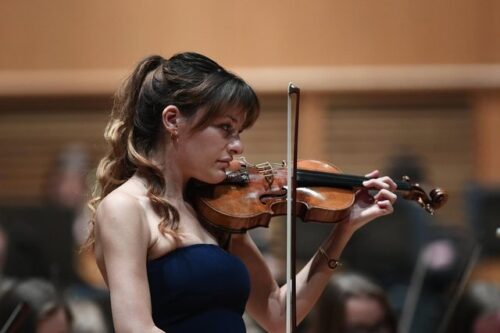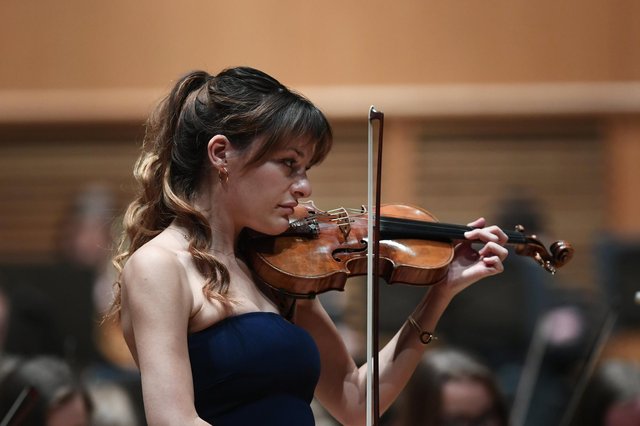 United Kingdom Mozart, J. Strauss II, Schoenberg: Nicola Benedetti (director/violinist), Scottish Chamber Orchestra / Benjamin Marquise Gilmore (director/violinist). City Halls, Glasgow, 17.12.2021. (GT)
United Kingdom Mozart, J. Strauss II, Schoenberg: Nicola Benedetti (director/violinist), Scottish Chamber Orchestra / Benjamin Marquise Gilmore (director/violinist). City Halls, Glasgow, 17.12.2021. (GT)

J. Strauss II – Overture, Der Zigeunerbaron, Op.422 (1885)
Mozart – Violin Concerto No.1 in B flat, K.207 (1773)
Schoenberg – Verklärte Nacht, Op.4 (1899)
J. Strauss II – Geschichten aus dem Wienerwald, Op.325 (1868)
This eclectic programme somewhat hints at the forthcoming festivities – although the appearance of Schoenberg’s Verklärte Nacht (Transfigured Night) seems an odd choice, but for me any piece by a member of the Second Vienna School is always welcome – the common factor of course lies in that this continues the theme of music from Vienna through the ages.
The Gypsy Baron overture was terrifically performed with Benjamin Marquise Gilmore leading energetically from the first desk taking us through the passages embracing a polka, an intermezzo and a dazzling waltz. We heard especially brilliant clarinet playing from Maximiliano Martin, the flute of André Cebrian, and the oboe of Robin Williams with some very colourful playing all obviously loving this sparkling music which is not without a hint of the Hungarian gypsy music which so inspired Brahms and Liszt on their trips to Budapest.
For Mozart’s First Violin Concerto we had the benefit of Scotland’s music ambassador Nicola Benedetti following the vibrant orchestral introduction of the Allegro moderato with an entry of sparkling gaiety and enhancing the charming harmonies engagingly by her beautifully performed cadenza. In the slow movement (Adagio) Benedetti invoked a wistful and somewhat elegiac mood – with no little theatricality – with a fine solo passage of heavenly beauty. The Presto finale was vibrant, joyously translucent, with the soloist almost dancing in rhythm to the composer’s gorgeous music, the pacy tempo evinced her engagement with what we heard that was splendidly completed by another brilliant cadenza in reconciling the themes of the seventeen-year-old Mozart’s masterpiece.
For the Schoenberg work, Benedetti assumed the leader’s chair – a role that I have not seen her take previously – exhibiting a new trait in her performance. Originally written for a string sextet, this is the version for chamber orchestra revised by the composer in 1943. The violas introduced the dark strains of Schoenberg’s Verklärte Nacht with the cellos sounding as if rising from the depths of humanity, followed eloquently by the first and second violins. Although the piece has no defined movements, through the five sections of Richard Dehmel’s poem, the intensity of playing was tangible in the woman declaring her pregnancy by another man, ‘I am carrying a child, and not by you’ and the terrible agonies of the heart of her lover and his acceptance of fate, ‘Do not let the child you have conceived be a burden on your soul…’. The playing embraced the emotional feelings through the high strings to the deeply grave bass sound, shifting from E flat minor to D major. Leading from the first violins, Benedetti was outstanding in bringing out the drama of the poetry with superb interplay between the string sections – slowly more enhanced emotions developed which emerged elegiac and beautiful, as the man tells his lover, ‘Look how brightly the universe shines! … That warmth will transfigure the stranger’s child.’ Through this darkly nuanced work, Benedetti was ever more prominent in drawing the raw emotions of the lovers with the poignancy ebbing and flowing through to the closing bars.
This was one of the finest performances of a single work that I have heard from the Scottish Chamber Orchestra for a very long time, underlining their stunning musicianship and artistry. In this interpretation, Benedetti’s part in it was crucial with her profoundly mellifluous playing bringing out all the emotional drama of the narrative of the two lovers in a dark forest at night. I have heard Benedetti perform in many diverse works in past seasons, however few have equalled this remarkable performance. In her collaboration with the SCO, she revealed a fresh quality of profound depth and poignant candour. The only work that I recall of this kind is her interpretation of Shostakovich’s First Violin Concerto, but here in the Schoenberg masterpiece, there was a fresh mastery and intensity in her interpretation.
The final piece in the evening’s programme took us to a quite different backdrop of the Vienna woods than that of Schoenberg’s work. Here we were entertained in a festive harmony by the gloriously prolonged opening of Johann Strauss’s little masterwork of a waltz, with the evocation of Alpine bagpipes and birdsong in the wind instruments. Rather than closing with the Schoenberg piece, the bright joyous nature of Strauss’s music brought a smile to the audience as they went out into the bitter cold evening. It would have been a splendid harbinger of the forthcoming New Year’s Day concert the SCO used to present annually at Edinburgh’s Usher Hall: but not this year again now because of the latest Covid restrictions!
Gregor Tassie
